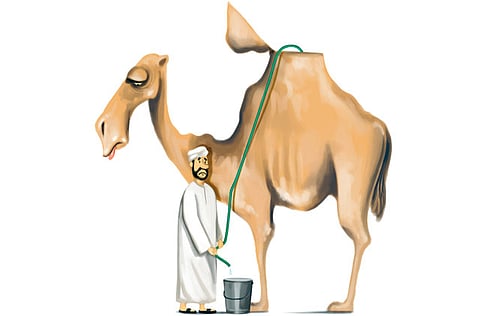Plan now for better future
None of the Arab world's major social challenges have immediate answers

Joined-up government is not easy. Many of the really major challenges facing the Gulf Cooperation Council states cannot be pigeon holed into the responsibility of one ministry, or one government-backed action plan.
For example, as issue like under-investment in infrastructure might seem simple since everyone agrees that everyone should get the best, but the answer is not just a question of building more roads, better water and sewerage systems, or getting every house connected with broadband.
To get such systems right, the planners have to know how many people will be living in a city or suburb ten years ahead. To answer that requires accurate long-term forecasts, and the only place to start asking those questions are the government statisticians, who are famously inaccurate and out-of-date in most Gulf states.
The UAE has done well in building infrastructure, and most visitors are impressed by the advanced state of the cities.
But even the UAE (which does this well) has had its problems, as is illustrated by the traffic jams of a few years ago in Dubai, and today in Abu Dhabi; or the lack of power and water in some of Dubai's new developments as the building outstripped the authorities' ability to keep up; and the continuing summer power cuts in Sharjah and Ajman.
Infrastructure is only one such cross- disciplinary responsibility of government. Last week in Marrakesh the World Economic Forum published a very informative report called Middle East at Risk 2010. It was unusual to read a report on risks in the Arab world which did not mention fighting Palestine and Israel, or tension in Lebanon, or Iran and Iraq. Instead, the Forum focused on three underlying social and economic forces which affect everyone's lives in the Middle East, even if they are not at the top of most people's daily awareness.
Water scarcity, energy security, and poor infrastructure were the three topics which the report said offered real challenges to the hopes of long-term development in most Arab states.
Most countries in the Middle East and North Africa are classed as arid or hyper-arid, which means they are well under the world's average in water supply, and therefore exposed to major political and economic risks, as the inadequate supply of water fails to match their growing economies.
The impacts of these shortages range over people facing increased costs of paying for their water, lower agricultural yields harming access to food, demand for increasingly expensive or unavailable energy to produce more and more fresh water, and in the final analysis there are risks of social upheaval or cross-border tension as water rights are disputed.
It is bizarre to think of energy as a problem in the world's richest hydrocarbon reserves, but access to power is not just a matter of burning lots of gas in power stations. Many parts of the Middle East do not have their own gas, and it is expensive to buy. In addition, even in gas-rich areas, it has to be supplied to the right areas at the right times.
There is also the huge problem of energy waste, in a region which has to pay for all its energy by using fossil fuels, but still squanders vast amounts of power by air-conditioning poorly constructed buildings, and desalinating millions of gallons of water which are poured away into the ground by badly advised irrigation farmers, or by others simply washing their cars every day.
And looming over all this waste of valuable energy is the urgent requirement to move away from burning fossil fuels and to reduce the greenhouse gases which are threatening the world as we know it.
In addition to these three ‘risk' issues, the question of how to offer quality education was a fourth topic running all through the discussions of where the Arab world is trying to get to. Assuming that the notoriously un-connected governments of the region can solve the exceptionally difficult challenges of finding and implementing regional water policies, shifting to green or sustainable energy, and providing world-class infrastructure to everyone in the region, then the people have to be ready to use all these benefits.
This will require the next generation to be ready to think for themselves, working in the global world that is becoming more of a reality every day, and ready to compete with the best in the world.
The political challenge today's governments have to deal with is how to plan for these complex issues. The first step is to be aware that these issues exist, the next step is to deal with the management challenge of getting government ministries and departments to work with each other, and only then can the right questions be asked.
None of these challenges have immediate answers, but they all require immediate action from all Arab governments, and those which do not look for the answers will soon find they are being left far behind.
Sign up for the Daily Briefing
Get the latest news and updates straight to your inbox


